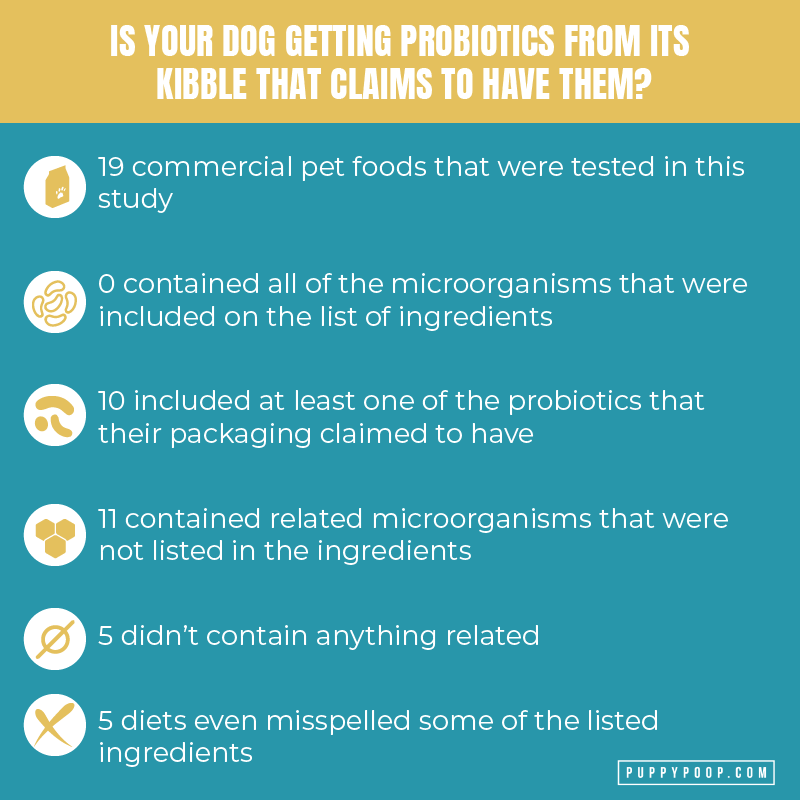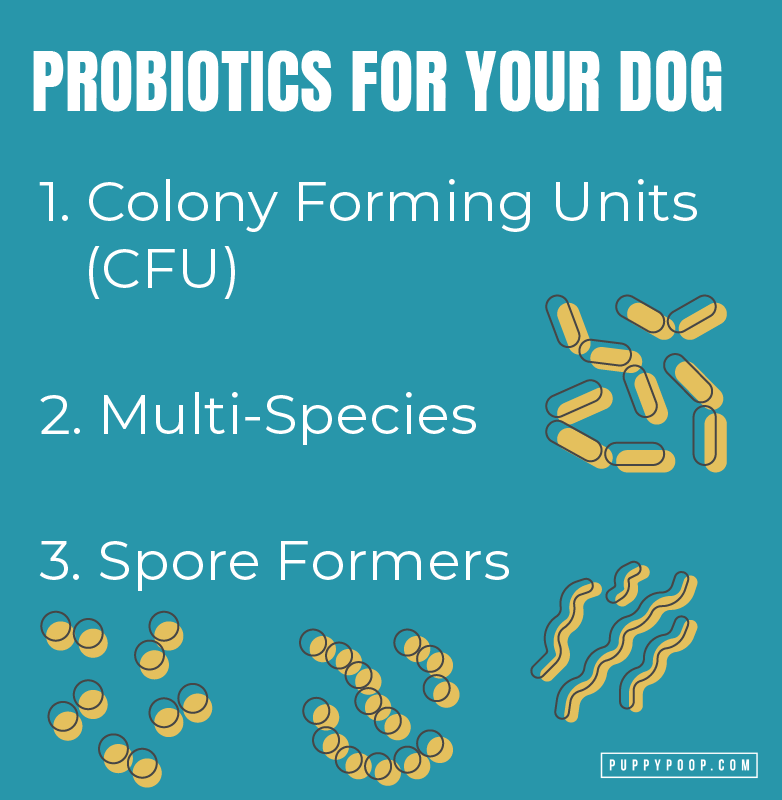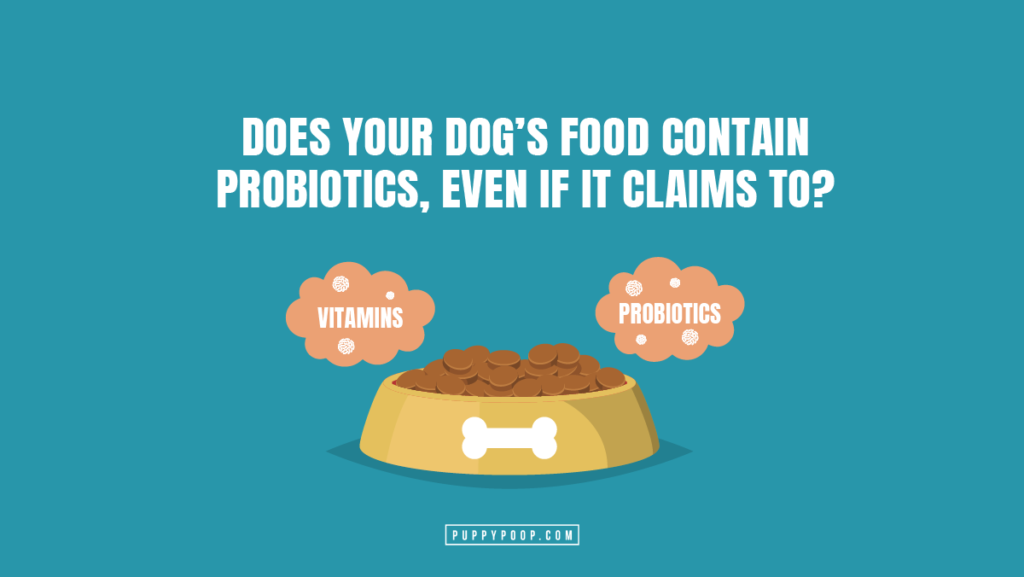Your kibble might be lying to you. Leaving you to wonder: does my dog food contain probiotics?
Have you ever felt overwhelmed by the number of choices there are in the pet food aisle at the supermarket?
It can be difficult to know which dog food is best for your pup’s specific needs. Especially when many brands claim that their foods help “promote alertness and mental sharpness” or that it’s been “clinically proven to maintain digestive health”.
We’ve always wondered here at DIG Labs just how accurate these claims are. We want the absolute best for our dogs and decided to look into some of these assertions, specifically surrounding the addition of probiotics in different types of kibble. Our own pups were struggling with digestive issues even though their kibble claimed to contain probiotics! We found a study done by the Canadian Veterinary Medical Association that tested nineteen different commercial pet foods that all claimed to incorporate probiotics into their formulas. The results, in answer to the question does my dog food contain probiotics, were shocking but very informative.
Probiotics

Probiotics are beneficial microorganisms that live in our dogs’ gastrointestinal systems, as well as in ours! These are so important for your pup because they can help boost immunity, aid digestion, and even fight off viruses. Often, probiotics are prescribed for pups that have an intestinal imbalance or other digestive disorders. Many times infections, parasites, old age, and even stress can cause these disorders. Shelter dogs often experience diarrhea because of the emotional stress of moving or losing a home. Probiotics are very advantageous for your dog, and many veterinarians swear by them. However, there are no federal regulations concerning their distribution because they are considered supplements, not drugs. This means that quality control is oftentimes insufficient, for human or animal use.
Prebiotics

Prebiotics are the meal of choice for probiotics! Simply put, prebiotics are ‘eaten’ by probiotics in the dog’s intestines. These are the carbs or fibers that help regulate the dog’s digestive system. They can both add bulk to the loose stool and can also relieve constipation. But how can they do both? Fiber can change the water content in the digestive tract. They can absorb the excess water from the loose stool. They can also add water in the case of constipation. Fiber is fermented near the end of the gut tube, creating nutrients called short-chain fatty acids (SCFA). These have antibacterial properties that help restore probiotic balance and relieve diarrhea. Thus, making them one of the best dog digestive problem remedies.
Does my dog food contain probiotics that it claims to?
This study tested nineteen commercial pet foods. Thirteen of those foods were for dogs and all of them claimed to contain specific probiotics. Unfortunately, none of these contained all of the microorganisms that were included on the list of ingredients. Ten out of the nineteen products tested (53%) included at least one of the probiotics that the packaging claimed to have. Eleven of these contained related microorganisms that were not listed in the ingredients. Five of these didn’t contain anything related. Many of these products only claimed to contain bacterial fermentation products, which are often added as a source of enzymes. However, these enzymes aren’t considered probiotics in the first place because they don’t necessarily imply that there are any live organisms included. Five of these diets even misspelled some of the listed ingredients, which is concerning.

Additionally, if these products in question contained the ingredient, they did not contain an acceptable amount of said ingredient. The most frequently found probiotic in this study were Enterococcus faecium. Unfortunately, this probiotic transfers a gene that is responsible for antibiotic resistance. Yikes!
How does DIG Labs help?
It’s disheartening to know that many of these pet food products don’t contain what they claim. This article was transformative to us as Pet Parents, because it motivated us to include live probiotics into our pups’ daily meals. Of course, in an ideal world, we would all be able to give our pets fresh, nutritionally balanced and full of wholesome vitamins and nutrients, every day! DIG Labs was created as a way to bridge the gap between traditional kibble and gourmet food. The solution is an all-in-one supplement topper that’s custom made for your pup and her unique needs! We wanted to create a product that was honest and would genuinely help improve your pup’s health with the best ingredients. So you can stop asking that nagging question, “does my dog food contain probiotics?”. As paw-rents ourselves, we know how important your four-legged family members are, and your family is our top priority.
Please join us in spreading the news to educate pet parents about what is really in their best friend’s food! Learn more about us here.
Choosing the Best Probiotic for Your Dog
With many probiotics available, how do you pick the best probiotic for your dog? Here are the three main elements we recommend researching when picking a probiotic for your pup:

Colony Forming Units (CFU)
In order for a meaningful amount of probiotics to successfully pass through the harsh digestive tract of dogs (which can reach a pH of 1 – the acidity of battery acid!), it is important to begin with a high CFU count since not all the bacteria will survive the trip. Begin by looking at the ratio of probiotics per serving on the back label. Some dog foods or probiotic supplements may only have a few million CFU per serving, which may not be sufficient for rebalancing or improving your dogs digestive tract. In general, we recommend at least 3 billion CFU per day for a small dog.
Multi-Species
Several of the commonly available probiotics are either single-species, or contain only a few different types of bacteria. For reference, dogs’ guts can accommodate thousands of unique species of bacteria. To help promote probiotic diversity, we recommend at least 10 species, including lactobacillus and bifidobacterium. For example, DIG Lab’s probiotic blend includes 11-species to provide a broad spectrum of good bacteria to support our dogs’ digestive systems.
Spore Formers
Spore formers are a special type of probiotic that are able to protect themselves from the harsh acidity encountered within the digestive tract. These spore formers activate when they reach the small intestine. While a high CFU count will maximize the opportunity for the probiotics to reach the small intestine, spore formers go one extra step further! We recommend including at least one spore former, such as bacillus coagulans, in your dog’s probiotic.
Get the DIG Labs App
Download the free DIG Labs Digestive Health Tracker to get personalized insights and recommendations for your dog based on their stool.

